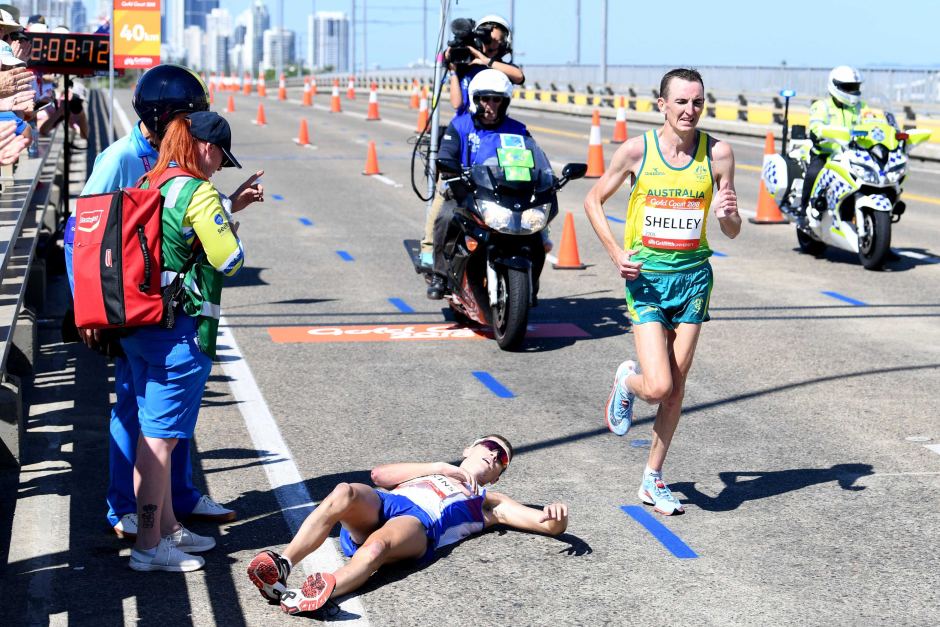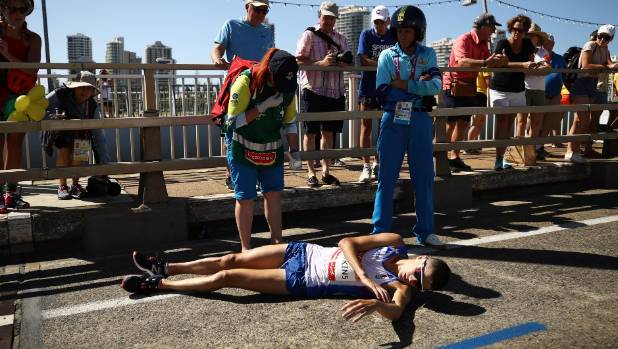In any discussion surrounding the marathon or its history, talk will at some point turn to Pheidippides, the Athenian hemerodromus who ran to Athens from the battle of Marathon to give word of the Greek victory over the invading Persians. Legend has it that Pheidippides arrived at Athens’ main plaza, shouted words to the effect of “Victory” and died on the steps, his effort in completing the final “marathon distance” run all but exhausting him.
In the modern world, the exertion of the elite athlete is something that we collectively yearn for. The sight of someone pushing themselves to the limit of their considerable abilities and achieving victory is a something that is uplifting and unifying for a group, even a country- but when does this go to far? And if something happens to that athlete, when do they become simply another human being in need of care and attention?
Today, Callum Hawkins of Scotland was in the box seat to take home the gold medal in the men’s Marathon at the Commonwealth Games in Australia. At kilometre 38, with a two minute lead on second place Hawkins' race fell apart, he became wobbly, crashing into the barrier, righting himself and carrying on, although he was at this point unable to run in a straight line. At kilometre 40 he fell to the ground in, as one commentator put it, “complete and utter distress” striking his head and face in the process. He was passed by the eventual winner, Michael Shelley of Australia, who himself looked distressed to see his fellow athlete in such a state of physiological trauma. What has left me questioning the reasoning of the race officials and the standard of care provided for the athletes was the official’s response to the crowd, who questioned if Hawkins was okay, they were told to leave him as “medical attention was on its way”. The crowd was further instructed not to attempt to assist Hawkins in any way as this would constitute outside attention and lead to his disqualification. This may have been a sound position to take if medical help had arrived swiftly. It did not, leaving Hawkins writhing on the baking tarmac for several minutes whilst the crowd looked on.
I would suggest at this point, as a registered health professional, and therefore with a duty of care to my fellow human, that I would have been over the gate and offering assistance to an athlete in a similar situation when it became obvious that A) their race was over due to the severity of their physiological distress B) It was apparent that they had struck their head falling and C) it was apparent that medical help was not arriving promptly. I am not saying this in any way as a means of self aggrandisement, however it is inconceivable to me in that situation that no one did offer assistance to a fellow human who was obviously in very deep trouble - even if they were told not to. I asked around some friends, some health professionals and others not, and received a resounding “yes” when I asked whether they would have offered assistance in the same situation. I struggle to understand the rationale of the officials and I would strongly suggest that the response time from the medical team only added to the potential for a negative outcome for Hawkins.
Elite athletes are aware of the potential for adverse outcomes. One of my earliest athletic memories is from 1998 Kuala Lumpur Commonwealth Games when in similar circumstances Craig Barrett fell to the ground unable to continue within sight of the finish line of the 50 KM race walk; but when does someone striving and getting into trouble cross the boundary between spectacle and farce? Clearly in that moment in the marathon today Callum Hawkins became simply a person in deep distress, and potentially serious trouble, who required urgent assistance. It was not forthcoming, and at a major international competition this is simply not good enough.
Is the “win at all costs” standpoint one that we should adhere to? Or celebrate? Please do not misread this. The struggle of the elite is wonderful to behold, but this episode has left me wondering if the cost of attempting to win by placing yourself in a state of extreme physiological and psychological distress is worth it if things do not go to plan, or even if they do.
As always I would welcome your comments and discussion on this topic.





